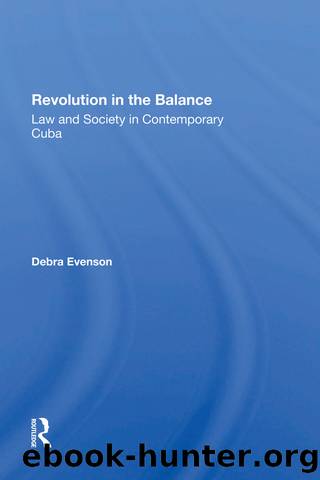Revolution in the Balance: Law and Society in Contemporary Cuba by Debra Evenson

Author:Debra Evenson [Evenson, Debra]
Language: eng
Format: epub
Tags: Political Science, General
ISBN: 9781000310054
Google: nq2bDwAAQBAJ
Goodreads: 52771081
Publisher: Routledge
Published: 2019-06-04T00:00:00+00:00
6
Family Law
Like the former Marxist regimes of Europe, the Cuban government has not attempted to socialize family functions significantly. To have done so would have been so at odds with the deeply rooted culture of patriarchy and so socially disruptive as to endanger other goals of the revolution. Although measures were taken early on to assist families economically and to formalize consensual unions, it was not until the mid-1970s, that the government undertook to define the socialist family, its role in society and the rights of its members. Rather than weaken the nuclear family, the revolution aspired to recreate it as the basic unit of the new socialist society.
The socialist Family Code adopted in 1975 was conceived as an instrument to cultivate an ideal family based on mutual affection and "absolute equality" between spouses and elimination of all discrimination applied to children, whether "legitimate" or not or adopted.1 It not only explicitly rejected the bourgeois family norms that maintained patriarchy and the subordination of women, it attempted to transform the marital relationship into one of true equality. Central to the Cuban concept of marriage is that men and women not only have equal rights with respect to property, but they each undertake obligations to contribute equally to die maintenance of the home and the care of children. This attempt to establish gender equality in the family is distinctly feminist in approach and distinguishes Cuban law and policy from that of other contemporary socialist countries.
As the revolutionary agenda unfolded, Cuban families were strained by the trauma of radical social transformation. The former social and political influence derived from family ties among the propertied classes evaporated with the nationalization of most private enterprise. Moreover, social upheaval led to deep family divisions. Many families were torn apart as members of the upper and middle classes emigrated in vast numbers in response to the socialization of the economy, the introduction of a new political order and the impact of the U.S. trade embargo, which created scarcities of consumer goods.2 In addition, although the marriage rate increased in the first decade after the revolution as a result of eased regulations to formalize consensual unions,3 the divorce rate soared as adjustments to radical social changes shook family bonds.4
In the early 1960s, the Cuban Roman Catholic Church together with help from the Spanish clergy and governmental and non-governmental agencies in the United States spread fear among the middle and upper classes that the new government was going to interfere with guardianship of children and destroy the family.5 Parents were urged to send their children unaccompanied to the United States to prevent the revolutionary government from sending them off to the godless Soviet Union for indoctrination. As a result of this project, dubbed Operation Peter Pan, thousands of parents were convinced by such propaganda to separate from their children, thinking it would be only a matter of months before the regime would be toppled. In the United States, these children were housed, fed and sent to schools. They
Download
This site does not store any files on its server. We only index and link to content provided by other sites. Please contact the content providers to delete copyright contents if any and email us, we'll remove relevant links or contents immediately.
A Question of Intent by David Kessler(550)
The Case Against the Democratic House Impeaching Trump by Alan Dershowitz(539)
Conviction Machine by Harvey Silverglate(483)
Rebooting Justice by Benjamin H. Barton(413)
I Won't Remember You (Aidan & Vicky Book 6) by Mairsile Leabhair(374)
Ownership, Narrative, Things by Dave Cowan Helen Carr & Alison Wallace(369)
Great Debates in Contract Law (Palgrave Great Debates in Law) by Jonathan Morgan(367)
Prisoners' Self Help Litigation Manual by Manville Daniel E Boston John(242)
Invisible Gold in Asia by Llewelyn David;(107)
The Southern Manifesto by John Kyle Day(96)
Collapsing Structures and Public Mismanagement by Wolfgang Seibel(81)
Public Administration in Germany by Sabine Kuhlmann; Isabella Proeller; Dieter Schimanke; Jan Ziekow(65)
Towards Resilient Organizations and Societies : A Cross-Sectoral and Multi-Disciplinary Perspective by Rómulo Pinheiro; Maria Laura Frigotto; Mitchell Young(60)
Encyclopedia of Death and Dying by Glennys Howarth (editor) Oliver Leaman (editor)(59)
NL ARMS Netherlands Annual Review of Military Studies 2021 : Compliance and Integrity in International Military Trade by Robert Beeres; Robert Bertrand; Jeroen Klomp; Job Timmermans; Joop Voetelink(58)
Revolution in the Balance: Law and Society in Contemporary Cuba by Debra Evenson(53)
Governing The Pandemic: The Politics Of Navigating A Mega-Crisis by Arjen Boin Allan McConnell Paul 't Hart(52)
TRIALS FROM CLASSICAL ATHENS by Christopher Carey(50)
Specifying and Securing A Social Minimum in the Battle Against Poverty by Toomas Kotkas; Ingrid Leijten; Frans Pennings (editors)(44)
